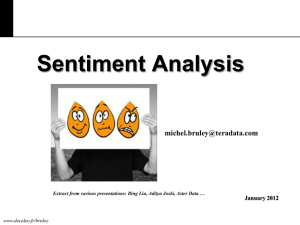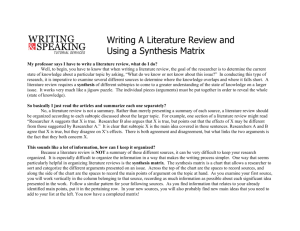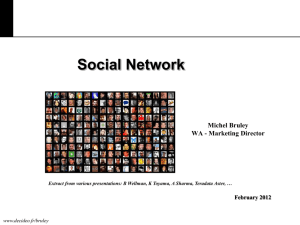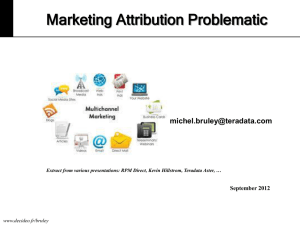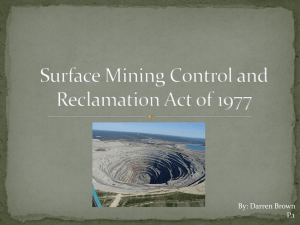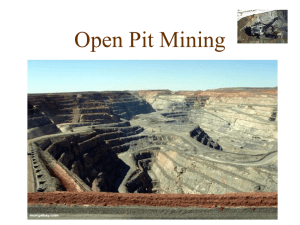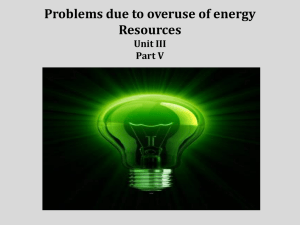1___text_mining_v0a
advertisement
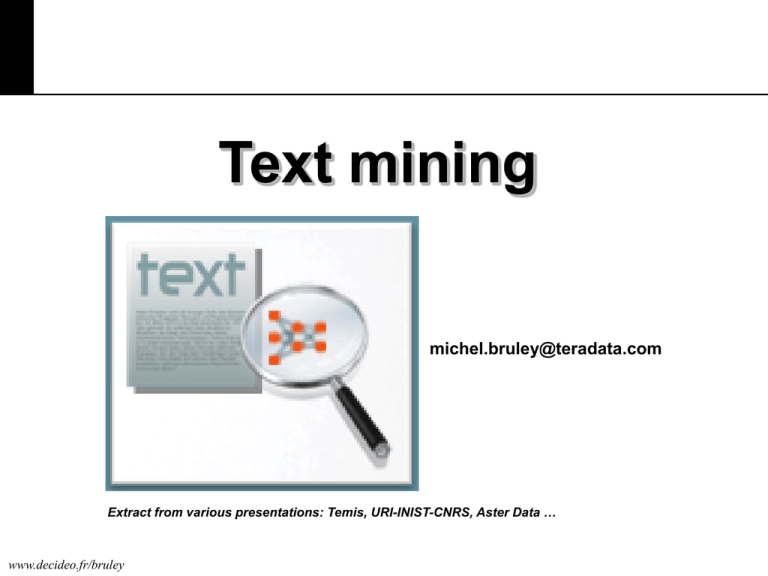
Text mining michel.bruley@teradata.com Extract from various presentations: Temis, URI-INIST-CNRS, Aster Data … www.decideo.fr/bruley Information context Big amount of information is available in textual form in databases and online sources In this context, manual analysis and effective extraction of useful information are not possible It is relevant to provide automatic tools for analyzing large textual collections www.decideo.fr/bruley Text mining definition The objective of Text Mining is to exploit information contained in textual documents in various ways, including … discovery of patterns and trends in data, associations among entities, predictive rules, etc. The results can be important both for: the analysis of the collection, and providing intelligent navigation and browsing methods www.decideo.fr/bruley Text mining pipeline Unstructured Text (implicit knowledge) Structured content (explicit knowledge) www.decideo.fr/bruley Text mining process Text preprocessing Syntactic/Semantic text analysis Features Generation Bag of words Features Selection Simple counting Statistics Text/Data Mining Classification- Supervised learning Clustering- Unsupervised learning Analyzing results Mapping/Visualization Result interpretation www.decideo.fr/bruley Iterative and interactive process Text mining actors Publishers Enriched content Annotation tools Tools for authors New applications based on annotation layers Richer cross linking based on content… Analysts Empowers them Annotating research output Hypothesis generation Summarisation of findings Focused semantic search… www.decideo.fr/bruley Libraries Linking between Institutional repositories Access to richer metadata Aggregation Aids to subject analysis/classification … Challenges in text mining Data collection is “free text”, is not well-organized (Semistructured or unstructured) No uniform access over all sources, each source has separate storage and algebra, examples: email, databases, applications, web A quintuple heterogeneity: semantic, linguistic, structure, format, size of unit information Learning techniques for processing text typically need annotated training XML as the common model, it allows: – Manipulation data with standards – Mining becomes more data mining – RDF emerging as a complementary model The more structure you can explore the better you can do mining www.decideo.fr/bruley Data source administration Intranet File System Databases EDMS Internet Web Crawling On-line Databank XML Normalisation -subject -Author -text corpora -keywords Information Provider Format filter www.decideo.fr/bruley Text mining tasks Name Extractions Term Extraction Text Analysis Tools Feature extraction Abbreviation Extraction Categorization Relationship Extraction Summarization Clustering Hierarchical Clustering Binary relational Clustering TM Text search engine Web Searching Tools NetQuestion Solution Web Crawler www.decideo.fr/bruley Information extraction Keyword Ranking Link Analysis Query Log Analysis Metadata Extraction Intelligent Match Duplicate Elimination www.decideo.fr/bruley Extract domain-specific information from natural language text – Need a dictionary of extraction patterns (e.g., “traveled to <x>” or “presidents of <x>”) • Constructed by hand • Automatically learned from hand-annotated training data – Need a semantic lexicon (dictionary of words with semantic category labels) • Typically constructed by hand Document collections treatment Categorization www.decideo.fr/bruley Clustering Text Mining example: Obama vs. McCain www.decideo.fr/bruley Aster Data position for Text Analysis Data Acquisition Gather text from relevant sources (web crawling, document scanning, news feeds, Twitter feeds, …) Pre-Processing Mining Analytic Applications Perform processing required to transform and store text data and information Apply data mining techniques to derive insights about stored information Leverage insights from text mining to provide information that improves decisions and processes (stemming, parsing, indexing, entity extraction, …) (statistical analysis, classification, natural language processing, …) (sentiment analysis, document management, fraud analysis, e-discovery, ...) Aster Data Fit Third-Party Tools Fit Aster Data Value: Massive scalability of text storage and processing, Functions for text processing, Flexibility to develop diverse custom analytics and incorporate third-party libraries www.decideo.fr/bruley Aster Data Value for Text Analytics • Ability to store and process massive volumes of text data – Massively parallel data stores and massively parallel analytics engine – SQL-MapReduce framework enables in-database processing for specialized text analytics tools • Tools and extensibility for processing diverse text data – SQL-MapReduce framework enables loading and transforming diverse sources and types of text data – Pre-built functions for text processing • Flexible platform for building and processing diverse analytics – SQL-MapReduce framework enables creation of flexible, reusable analytics – Embedded MapReduce processing engine for high-performance analytics www.decideo.fr/bruley Aster Data Capabilities for Text Data Pre-built SQL-MapReduce functions for text processing • Data transformation utilities - • Unpack: extract nested data for further analysis Custom and Packaged Analytics Aster Data nCluster App App Web log analysis - • Pack: compress multi-column data into a single column Sessionization: identify unique browsing sessions in clickstream data Text parser: general tool for tokenizing, stemming, and counting text data - nGram: split text into component parts (words & phrases) - Levenstein distance: compute “distance” between words www.decideo.fr/bruley App App Aster Data Analytic Foundation Text analysis - App App SQL-MapReduce SQL Data Data Data
